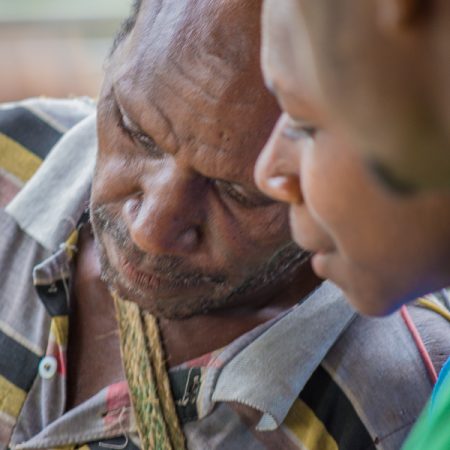By Todd
Peering out the window of a Fokker F100 airliner at 30,000 feet above the Papua New Guinean landscape will take your breath away. A few minutes out of Port Moresby you will be flying over mountain ranges nestled among mountain ranges, many peaks over 10,000 feet, inscribed with deep, steep river valleys, plumes of smoke rising out of new gardens, patches of cumulonimbus clouds, and equatorial sunshine. If you are fortunate, the plane banks so that you see both the Highlands and, on the horizon, the Coral Sea which separates Papua New Guinea from Australia. As you allow your eyes to drink in the equatorial beauty, perhaps your mind wanders to the innumerable species of animal life crawling through the unexplored jungles or multiplying in the world-renowned reefs.
Missionary concerns, however, steer the mind toward the people down below, walking the earth. Papua New Guinea is home to more than 850 languages, each with their own cultural distinctives. The peoples of Papua New Guinea are living in an era when traditional ways are being challenged. Younger generations are looking both backward into their deepest history and forward into their distant future, weighing what they find in the balance. Those of an elder generation wrestle with adherence to their traditions (the known) along with the newfound challenges born from the advent of technology (cell phones, for example) or increased access or the pressures of national identity (the unknown).
How can these generations come together in such a way as to preserve the best of their God-given culture and adapt to new ways? How can the church, along with the Scriptures in the heart language, help address this challenge?
 There is no power grid in Uria Village, where my family and I live. When I want to use power tools, I have to start up a generator, set things out, run extension cords, etc. All this activity and noise attracts attention. Almost always, within minutes, a host of young people arrive and stand around the edges of the activity, quietly watching, taking everything in. Sometimes one of the young men will step in and hand me a tool or offer to try his hand at what I’m working on. Often guys my age (the dads and uncles) are there and, if we are grinding machetes on the bench grinder or doing some other task commonly known to us all, they will hand a knife to a young man and watch while the young man tries. Occasionally he will take the boy by the hands and physically guide him, other times he will whisper words of encouragement or correction.
There is no power grid in Uria Village, where my family and I live. When I want to use power tools, I have to start up a generator, set things out, run extension cords, etc. All this activity and noise attracts attention. Almost always, within minutes, a host of young people arrive and stand around the edges of the activity, quietly watching, taking everything in. Sometimes one of the young men will step in and hand me a tool or offer to try his hand at what I’m working on. Often guys my age (the dads and uncles) are there and, if we are grinding machetes on the bench grinder or doing some other task commonly known to us all, they will hand a knife to a young man and watch while the young man tries. Occasionally he will take the boy by the hands and physically guide him, other times he will whisper words of encouragement or correction.
This kind of quiet discipleship–elders teaching the younger day by day, principle by principle, skill by skill–will contribute to these cultures thriving in an era of change. Within the church, this kind of quiet discipleship will help young people forge a faith that stands in the evil day, withstands the various changes of life, establishing strength and continuity within the community of faith.
As you pray for the people of Papua New Guinea, ask the Father to give faith leaders wisdom, discernment, and courage to quietly disciple a generation of world changers, developing in them qualities that will make Jesus famous in Melanesia, in the Pacific region, and around the world.
Todd is a Bible translator.